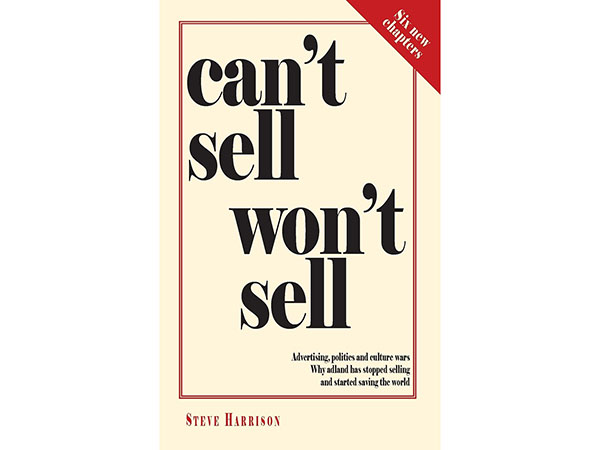Industry Talk - Free Talk
The culture war comes to Adland: how the advertising industry stopped selling and started saving the world
September 30, 2021

Can’t Sell, Won’t Sell: Advertising, Politics and Culture Wars is an explosive new book by multiple Cannes Lions award-winner Dr. Steve Harrison, who argues that the UK’s advertising industry has abandoned its core objective of selling in favour of championing a culturally left-leaning social agenda.
As Harrison says: “Advertising’s role is to generate demand, growth and profit – but this commercial purpose has been replaced by social purpose. Selling products is a distant second – now advertising’s goal is to change the consumer’s world view. But that’s not our role, and we are alienating a culturally conservative mainstream by trying to impose our divisive, progressive views upon them.”
‘Selling products is a distant second – now advertising’s goal is to change the consumer’s world view.’
The activists who are dictating the progressive agenda
Harrison argues that these views are being pushed by a small clique of careerists and activists who have taken over advertising’s institutions and top London-based agencies.
“The trade press sends out emails saying ‘There’s no merit to profit without purpose’, and acts as the mouthpiece of a suffocating monoculture that’s being imposed on a once-brilliant creative industry.
“Greenwash and wokewash are encouraged by the industry awards shows. And prizes are given to social purpose-driven campaigns that are little more than PR scams.”
A recent example is Cadbury’s 2019 campaign to remove the words from its Dairy Milk bar in support of Age UK to ‘solve old age loneliness’. Only for it to be largely silent on the subject months later when Covid lockdown restrictions plunged the elderly into what Age UK described as ‘devastating levels of anxiety’.
More recently there’s Brewdog (famous for its controversial “FUCK YOU CO2” billboards) and the damning open letter sent by ex-employees challenging the brewer’s well publicised commitment to sustainability, given its ‘years of vanity projects and use of a private jet’.
According to Harrison, Adland is not only a left-leaning progressive enclave, but also a young, white, privileged middle-class gated community. Citing recent research Harrison says: “Advertisers and marketers diverge from the mainstream on every major psychological, behavioural and attitudinal framework – they inhabit two different worlds.”
As a result of this divergence, while the rest of the UK has been struggling with the pandemic and its economic repercussions, Harrison claims the ad industry has turned a blind eye. He believes that a London-centric industry has ignored the vital part it can play in driving growth, recovery, employment and the societal healing that comes with the return to prosperity.
“Until recently people loved the adverts on TV. But an industry that once enriched our nation’s culture is now so cut off from the mainstream, you would need a telescope to see Adland’s bubble circling the real world.”
Part of a bigger culture war
Harrison believes the situation he describes in adland replicates what is happening in most of the UK’s cultural, academic and charitable institutions – an unelected, left-leaning clique is imposing its worldview onto an increasingly angry majority.
Until recently people loved the adverts on TV. But an industry that once enriched our nation’s culture is now so cut off from the mainstream, you would need a telescope to see Adland’s bubble circling the real world.”
“This is not just one of advertising’s periodic fads. This is underpinned by an ideology that seeks to politicise the workplace and every aspect of cultural life,” claims Harrison. “And it is turning advertising into the communications wing of those pushing a broader radical woke agenda.”
Praise for Can’t Sell, Won’t Sell
Far from being shunned by the industry, advertising’s leading names have come out in support of the book’s premise.
Jeremy Bullmore, an advisory board member on the world’s largest advertising agency network, WPP, called the book “A ruthlessly direct analysis of what’s gone wrong with advertising, and why”.
Adland’s leading commentator, Dave Trott says “I agree with everything in it. It would be good for our industry if lots of agencies buy it and distribute it to their staff.”
Richard Huntington, Chairman and Chief Strategy Officer, Saatchi & Saatchi London Group says: “Little has caused me to think about our industry and where we are than this fascinating and well researched book.”











